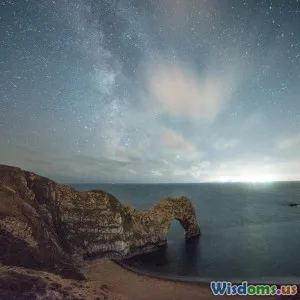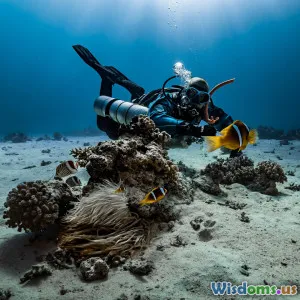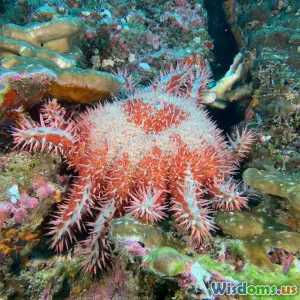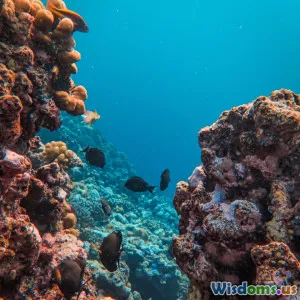
How Night Diving Reveals Ocean Wonders You Never Imagined
9 min read Discover how night diving unveils oceanic marvels hidden from daytime eyes and transforms your underwater experience forever. (0 Reviews)
How Night Diving Reveals Ocean Wonders You Never Imagined
Introduction
Imagine descending into the ocean deep under a starlit sky, the only light filtering from your dive torch piercing through the blackness. The vibrant clarity and colors you witnessed during daytime dives are replaced by a trance-like, otherworldly glow. Night diving reveals a thrilling side of marine life rarely seen—where countless species emerge, interact, and illuminate the depths in dazzling displays. It is a wholly different ecosystem pulsing with rhythm and mystery, shattering our daytime perceptions of the ocean.
As the surface world settles into sleep, the sea springs into life. Some of the most extraordinary and bizarre behaviors come to the forefront, from glowing plankton swirling like galaxies to elusive predators stealthily hunting. Scientists and passionate dive enthusiasts alike attest to night diving as an eye-opening gateway to understanding the ocean’s complexity and fragile beauty. Let’s journey below the waves after dark and discover the oceanic wonders night diving uniquely reveals.
The Magic of Bioluminescence
One of the most captivating phenomena encountered during night diving is bioluminescence—the natural emission of light by living organisms. Over 80% of deep-sea and many coastal species possess this glowing ability. During the day, bioluminescent creatures often hide, but at night their light bursts into the darkness create stunning and surreal spectacles.
What Causes Bioluminescence?
Bioluminescence results from a chemical reaction involving luciferin (a light-emitting molecule) and luciferase (an enzyme). This reaction produces cold light—a glow without heat. Marine organisms use this ability mainly for camouflage, attracting prey, communication, or as a defense mechanism.
Examples of Bioluminescent Marine Life
- Dinoflagellates: These tiny plankton emit eerie blue lights when agitated by waves or a diver’s movement. Their organized glow can create mesmerizing “sea sparkles.” One famous bioluminescent bay, Mosquito Bay in Puerto Rico, teems with such plankton, making night paddling and diving famously magical.
- Firefly Squid: Found in Japan, these tiny squids light up their undersides in pulses, creating a bioluminescent ballet visible at night.
- Lanternfish: Dwelling at deeper ocean layers, their bodies are dotted with photophores that flash rhythmic lights, aiding communication or camouflage.
Why Is Bioluminescence Important?
Bioluminescence plays a crucial ecological role, influencing predator-prey dynamics and mating. For divers, witnessing this phenomenon highlights the ocean's extraordinary adaptations, pushing us to respect and protect such fragile systems.
Nocturnal Marine Life and Their Behaviors
The ocean hosts a radically different cast of characters once daylight fades, many of which tiptoe or hunt under cover of darkness.
Unique Creatures of the Night
- Coral Reefs' Night Shift: Many reef fish are daytime dwellers; at night, these retreat, giving way to nocturnal species such as crabs, lobsters, and moray eels. Observing these creatures at night reveals their intricate behaviors like hunting techniques and unique social interactions.
- Octopuses and Cuttlefish: These intelligent cephalopods often display vibrant colors and patterns at night for mating or camouflage, a spectacle elusive during the day.
- Predatory Fish and Sharks: Some shark species patrol reefs and sandy bottoms at night, taking advantage of lower visibility for stealth hunting.
How Night Diving Changes Perception
By diving at night, one steps beyond conventional diving experiences completely focused on coral colors and fish schools, into an almost alien realm. Divers report a heightened sense of awe as they see normally shy and elusive creatures up close, behaviors invisible by day. The dynamics of predator and prey interactions unfold live before your eyes, presenting valuable behavioral insights.
Technical and Safety Considerations in Night Diving
While the allure of night diving is undeniable, it requires specialized knowledge, skills, and equipment to ensure safety.
Essential Equipment
- Primary Dive Light: This is indispensable for navigation and observing marine life.
- Backup Lights: Crucial in case the main light fails underwater.
- Glow Sticks and Surface Signals: These aid divers in group location and surface detection.
Training and Preparation
Night diving certifications by reputable agencies like PADI provide critical training. Divers learn techniques for buddy communication, navigation, and emergency protocols specific to reduced visibility and altered spatial references.
Environmental Awareness
Nocturnal ecosystems are delicate. Responsible night divers ensure they avoid disturbing resting daytime species, minimize light pollution, and preserve habitats.
Real World Insights and Experiences
Scientists' Perspective
Marine biologists utilize night diving to study patterns impossible to observe during daylight, such as spawning events or coral polyp behaviors, enhancing our understanding of marine ecology.
Dr. Sylvia Earle, renowned oceanographer, emphasizes, “The night ocean is a frontier of discovery—it challenges our thinking about life underwater, often revealing behaviors and species hidden in daylit studies.”
Diver Testimonials
Jamie Lee, an experienced night diver from Australia, shares, “The moment you flick your torch on in the abyssal quiet of night, the ocean dazzles with soft glows and mysterious movement you can’t imagine by day. It’s humbling and addictive.”
Such experiences inspire many divers to advocate ocean conservation after witnessing firsthand the fantastical yet vulnerable marine biodiversity at night.
Conclusion
Night diving transforms the way we view the ocean—from a familiar environment bathed in sunlight to an enigmatic, dynamic realm of light and life hidden in the darkness. It reveals spectacular bioluminescent displays, uncovers secret nocturnal behaviors, and opens new windows into the complexity and beauty of marine ecosystems.
By embracing night diving, divers, scientists, and ocean enthusiasts gain intimate encounters that enrich appreciation and deepen commitment to protecting the ocean’s nocturnal wonders. Each dive after dusk is more than adventure—it is a journey of revelation and respect towards a world we scarcely imagined existed beneath the waves.
For anyone eager to dive deeper into marine mysteries, night diving is a vital and mesmerizing start.
References
- Haddock, S.H.D., Moline, M.A., & Case, J.F. (2010). Bioluminescence in the Sea. Annual Review of Marine Science, 2, 443–493.
- Earle, S. (2007). The World Is Blue: How Our Fate and the Ocean’s Are One. National Geographic Books.
- PADI Night Diving Specialty Course Materials (2023).
- Personal interview with Jamie Lee, experienced night diver, 2023.
- Mosquito Bay Preservation Society, Puerto Rico.
Further Reading
- Exploring Bioluminescence Ecosystems Worldwide
- Coral Reef Conservation and Nocturnal Marine Species
- Dive Gear Essentials for Safe Night Diving
Embark on your own night dive to discover the ocean luminance and creatures that daylight never reveals.
Rate the Post
User Reviews
Popular Posts



















